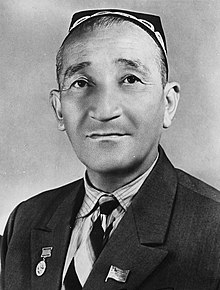You can help expand this article with text translated from the corresponding article in Russian. (May 2024) Click for important translation instructions.
|
| Gʻafur Gʻulom Ғафур Ғулом | |
|---|---|
 | |
| Born | Gʻafur Gʻulomovich Gʻulomov (1903-05-10)May 10, 1903 Tashkent Russian Turkestan, Russian Empire |
| Died | July 10, 1966(1966-07-10) (aged 63) Tashkent Uzbek SSR, Soviet Union |
| Occupation | Poet, teacher, literary translator, and writer |
| Literary movement | realism |
| Notable awards |
|
| Children | Kadyr Gulyamov |
Gʻafur Gʻulom (May 10, 1903 – July 10, 1966) was an Uzbek poet, writer, and literary translator. He is best remembered for his stories Shum Bola (The Mischievous Boy) (adapted for film in 1977) and Yodgor. Gʻafur Gʻulom is also known for translating the works of many influential foreign authors, such as Alexander Pushkin, Vladimir Mayakovsky, and William Shakespeare. He translated Le Mariage de Figaro of Pierre Beaumarchais, Othello of William Shakespeare, and Gulistan of Saadi Shirazi into Uzbek.
Gʻafur Gʻulom is considered to be one of the most influential Uzbek writers of the 20th century. He is also regarded as one of the founders of modern Uzbek poetry, along with Hamza Hakimzoda Niyoziy. Gʻafur Gʻulom received the prestigious State Stalin Prize in 1946 and became a National Poet of the Uzbek SSR in 1963.
Life
Gʻafur Gʻulomovich Gʻulomov was born to a poor family on May 10, 1903, in Tashkent. His father, Gʻulom Mirza Orif, knew Russian and was fond of reading poems and could himself write poetry. He died when Gʻafur Gʻulom was only nine years old.
Gʻafur Gʻulom first went to a so-called old school, a quasi-Muslim school, and later enrolled in a Russian tuzem school (Russian: Ру́сско-тузе́мная шко́ла), an elementary school for non-Russians in Turkestan. After completing a teacher preparation program, he started to teach at a contemporary school. In 1923, he was appointed the head of the curriculum department at an orphanage. During that time Gʻafur Gʻulom also started working on the editorial board of different publications, such as Kambagʻal dehqon (The Poor Farmer), Qizil Oʻzbekiston (Red Uzbekistan), and Sharq haqiqati (The Truth of the East). Working on editorial boards gave him a chance to learn about the life of ordinary citizens.
Gʻafur Gʻulom was also a supporter of the Jewish people, and promoted peaceful relations with them. During World War II he wrote a poem called "Men – Yahudiy" or "I'm a Jew". His wife was an Ashkenazi Jew.
Gʻulom died of illness at the age of sixty three on 10 July 1966, in Tashkent.
Archives show that he issued denunciations of other Uzbek writers to Soviet authorities. Unlike some of his counterparts who were also informants, he never showed any regret for the denunciations he issued.
Works

Gʻafur Gʻulom's first poetry collections, Dinamo (Dynamo) and Tirik qoʻshiqlar (Alive Songs), were published in 1931 and 1932, respectively. In these books he criticized the unsophisticated traditions of the peoples of Turkestan and praised the diligent work of ordinary citizens. In the 1930s, in addition to numerous short stories, essays, and satirical articles, Gʻafur Gʻulom wrote many longer narratives, such as Netay (What Should I Do?), Yodgor, and Tirilgan murda (The Corpse that Came Alive).
During the Soviet-German war against Nazi Germany and its allies, Gʻafur Gʻulom devoted his time and efforts to writing about the war. His poems Sen yetim emassan (You're not an Orphan), Oltin medal (The Golden Medal), Kuzatish (Seeing off), Vaqt (Time), and Sogʻinish (Missing) became highly popular among Uzbeks.
In 1943, Gʻafur Gʻulom became a member of the Academy of Sciences of Uzbekistan. During the last 20 years of his life, he published almost twenty poetry books. Many of his works have been translated into other languages.
Gʻafur Gʻulom received many awards and honors throughout his life. He was awarded the Order of the Badge of Honour in 1944. For his compilation of poems about the Soviet-German war, Sharqdan kelayotirman (I'm Coming from the East), Gʻafur Gʻulom was awarded the State Stalin Prize in 1946. He received the Order of the Red Banner of Labour twice, in 1939 and 1963. He was also twice awarded the Order of Lenin. In 1970, he was posthumously awarded the Lenin Prize. In 2000, Gʻafur Gʻulom was posthumously awarded the National Order of Merit (Uzbek: Buyuk xizmatlari uchun), one of independent Uzbekistan's the most prestigious medals.
See also
Notes
References
- "Gʻafur Gʻulom". Ziyouz (in Uzbek). Retrieved February 4, 2012.
- Mirbadaleva, A. S. "Gafur Gulyam". In A. M. Prokhorov (ed.). Great Soviet Encyclopedia (in Russian). Moscow: Soviet Encyclopedia.
- "Gʻafur Gʻulom". Ensiklopedik lugʻat (in Uzbek). Vol. 2. Toshkent: Oʻzbek sovet ensiklopediyasi. 1990. p. 210. 5-89890-018-7.
- Khalid, Adeeb (2015). Making Uzbekistan: Nation, Empire, and Revolution in the Early USSR. Cornell University Press. ISBN 978-1-5017-0134-4.
- Ashur, Sadriddin (January 19, 2010). "Халқим деган Ойбек абадиятга қолди." [Oybek, who is called my people, has remained forever]. Озодлик радиоси (in Uzbek). Retrieved December 15, 2024.
- Zufarov, Komiljon, ed. (1980). "Gʻafur Gʻulom". Oʻzbek sovet ensiklopediyasi (in Uzbek). Vol. 14. Toshkent. pp. 317–319.
{{cite encyclopedia}}: CS1 maint: location missing publisher (link) - "О НАГРАЖДЕНИИ МАСТЕРОВ ЛИТЕРАТУРЫ И ИСКУССТВА, ВНЕСШИХ ОГРОМНЫЙ ВКЛАД В РАЗВИТИЕ УЗБЕКСКОЙ НАЦИОНАЛЬНОЙ КУЛЬТУРЫ". lex.uz. Retrieved August 26, 2023.
External links
Categories:- 1903 births
- 1966 deaths
- 20th-century male writers
- 20th-century novelists
- 20th-century short story writers
- 20th-century translators
- 20th-century Uzbekistani poets
- 20th-century Uzbekistani writers
- Writers from Tashkent
- People from Syr-Darya Oblast
- Recipients of the Stalin Prize
- Recipients of the Lenin Prize
- Recipients of the Order of Lenin
- Recipients of the Order of the Red Banner of Labour
- Uzbekistani novelists
- Uzbekistani male poets
- Uzbekistani translators
- Uzbekistani male short story writers
- Translators from Russian
- Translators to Uzbek
- Soviet writers
- People's Poets of Uzbekistan
- Recipients of the Order of Outstanding Merit